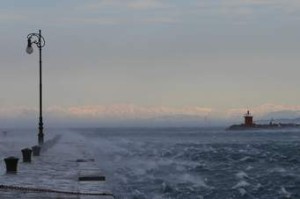 Way down south, they call the wind Mariah, but in Trieste, they call it the bora. It blows across the rugged mountains of the Karst, is pulled down the hillsides toward the Adriatic Sea, picks up speed and wreaks havoc over the land and sea below.
Way down south, they call the wind Mariah, but in Trieste, they call it the bora. It blows across the rugged mountains of the Karst, is pulled down the hillsides toward the Adriatic Sea, picks up speed and wreaks havoc over the land and sea below.
The bora wind is katabatic. Katabasis is Greek for “descending,” so katabatic winds are also rather poetically called “fall winds,” although they don’t necessarily occur in the fall. (Really they should be called “falling winds,” redolent of something Frank Lloyd Wright might have designed.) Katabatic winds occur when a cold air mass, which (by virtue of the fact that it is cold and its molecules are squeezed together tightly—I think) is heavier than the air beneath it, “falls” down the slope of a mountain replacing the warmer and lighter air below. The result is a bitter cold, sometimes ferocious and always chaotic wind.
Intimate knowledge of the wind is essential for pilots. If it weren’t for the breeze, I like to say, flying would be a breeze. Flying in turbulence requires a special set of skills, and being able to land in stirring crosswinds is the difference, perhaps, between a pilot and an airplane driver.
The city of Trieste itself is designed to some degree to shelter its inhabitants from the wind, with thin winding streets and some buildings sporting railings built into their walls onto which people can grasp when the wind winds up.
Life in Trieste without the bora might be pleasant enough, but it would lack that reminder of what living in the real world is like.
Many years ago a very green intern I was supervising complained to me that she just wasn’t getting this therapy thing. She was a chipper one, effervescent, with a quick and easy smile. I liked being around her, but not for too long. So I played a hunch and asked her what her own, personal goal in life was. She said, predictably, that it was to be happy. “Isn’t that everyone’s goal?”
Trying to be kind, I simply said, “I want you to do me a favor. When you go home I want you to think about that goal of yours. Think about it long and hard. Then, when we meet again next week, let me know what you come up with. If it’s the same thing, then that’s fine, but I want you to think about it.”
Sure enough my childish ploy worked, just like telling a kid not to eat his tofu might work the first time. She came back and said “You were right!” even though I said nothing to be right about. “I don’t want to be happy, not all the time. That wouldn’t be real life.”
“No, it wouldn’t be real,” I said simply. “You want to feel things deeply, and sometimes that means happiness and sometimes it means pain, guilt, shame, or anger.” She then said she thinks she now better understood how this therapy thing worked, and from then on—when she stopped trying to guide her clients towards happiness, she became a more competent therapist.
Trieste has a raw beauty to it. The deep blue Adriatic, the quaint, cobblestone streets that wind their way gently up the side of a hill, the singular kindness of the people you meet, the magic of the baristas concocting what they claim to be the best coffee in the world, and so much more. There is beauty all around, yet even without the bora blowing much of it can be dreary as well. No one quite knows for sure why, for example, it happens to have one of the highest suicide rates in Italy.
If we had the mindset of thinking that life is about being happy, we wouldn’t welcome the bora, in whatever form it manages to assault our lives. We wouldn’t dare go outside and tussle with it. We would avoid life’s challenges rather than face them.
A souvenir bookmark that accompanied a purchase I made at one of Trieste’s numerous bookstores has two pictures on it. One is a picture of the grand palace and the other is of the bora as it tosses the sea over the pier. The juxtaposition of the two photos is compelling. Can we really appreciate the grandeur of our shelters without bowing to that which we seek our shelter from?

This one was so good Ira! I hope you are doing well.